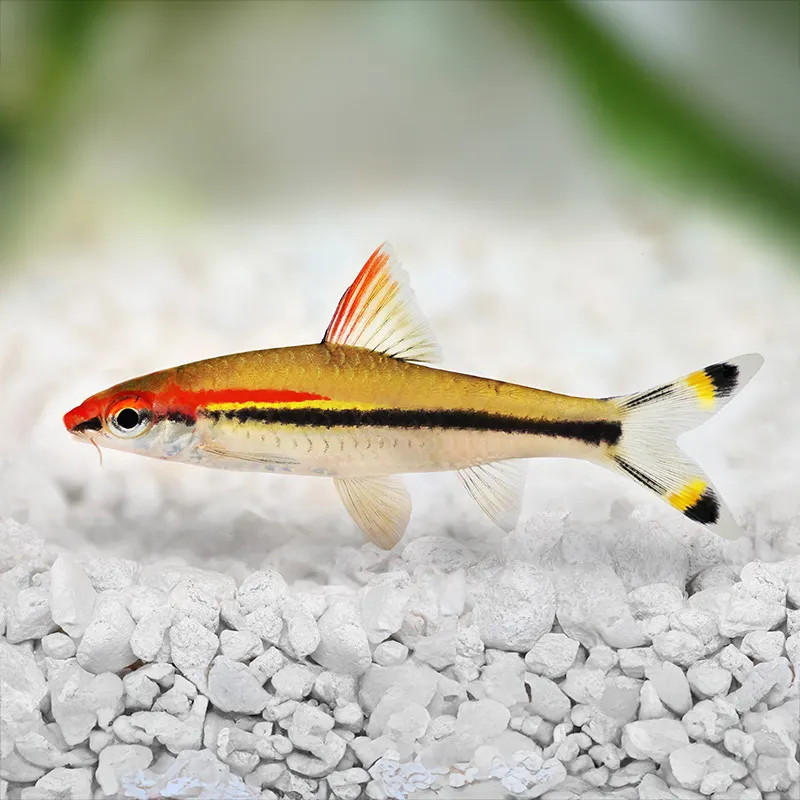Stocks Available
ODESSA
SKU:117163
PUNTIUS SP
1.5 INCH

Stock Available
Introduction: • Species: Denison Barb • Common Names: Denison Barb, Rosy Barb, Red-Finned Barb • Natural Habitat: Native to the rivers of the Western Ghats in India, typically found in fast-flowing streams with rocky substrates. Physical Characteristics: • Appearance: Elongated, torpedo-shaped body with a striking coloration; features a vibrant red or orange stripe along the lateral line, contrasting with a silvery body and distinct black markings. • Size: Grows up to 4-6 inches (10-15 cm) in length. • Lifespan: Average lifespan of 5-7 years with proper care. Habitat Requirements: • Tank Size: Minimum of 30 gallons for a small group; larger tanks are preferred for better swimming space. • Water Conditions: o Temperature: 70-78°F (21-26°C). o pH: 6.5-7.5. • Aquascaping: Provide plenty of open swimming space, along with hiding spots using plants, rocks, and driftwood to mimic their natural environment. Diet: • Primary Diet: Omnivorous; in the wild, they feed on small insects, crustaceans, and plant matter. • Supplemental Feeding: Offer high-quality flakes or pellets, supplemented with live or frozen foods like daphnia, brine shrimp, and bloodworms. • Feeding Frequency: Feed small portions 1-2 times a day for optimal health. Compatibility: • Temperament: Generally peaceful and social; best kept in groups of 6 or more to promote natural schooling behavior. • Suitable Tank Mates: Compatible with other peaceful community fish of similar size; ideal for community tanks with a diverse selection of species. • Incompatibilities: Avoid aggressive or fin-nipping species that may stress or harm the Denison Barbs. Care Level: • Difficulty: Moderate; requires stable water parameters and regular maintenance to thrive. • Health Monitoring: Monitor for signs of disease, especially stress-related issues and common parasites. Breeding: • Breeding in Captivity: Possible with suitable conditions; they can spawn in a separate breeding tank. • Spawning: Egg scatterers; they lay eggs among fine-leaved plants and may not exhibit parental care after spawning. Economic Considerations: • Market Demand: High demand among freshwater aquarium enthusiasts for their striking appearance and schooling behavior. • Wholesale/Retail Pricing: Prices vary; captive-bred specimens may be more affordable than wild-caught individuals due to sustainability efforts. Sustainability and Conservation: • Wild Population: Populations are under pressure from habitat destruction and pollution; captive breeding efforts help alleviate some of this pressure. • Aquaculture Efforts: Increasingly bred in captivity to reduce reliance on wild populations and promote sustainable practices. • Regulations: Compliance with local and international regulations concerning the trade of freshwater fish is essential for conservation. Conclusion: The Denison Barb is a vibrant and dynamic addition to freshwater aquariums, valued for its striking coloration and peaceful nature. Their care requirements and schooling behavior make them suitable for both novice and experienced aquarists. With proper care and attention to their habitat and dietary needs, Denison Barbs can thrive, adding beauty and liveliness to any aquarium setting.
Data sheet
16 other products in the same category:
Customers who bought this product also bought: